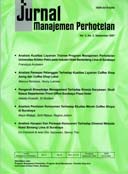PENGARUH BIG FIVE PERSONALITY TRAITS TERHADAP NIAT UNTUK MENGINAP DI GREEN HOTEL DI INDONESIA
DOI:
https://doi.org/10.9744/jmp.7.1.10-19Keywords:
Big five personality traits, Green Hotel, Niat untuk menginapAbstract
Penelitian ini dilakukan untuk mengetahui pengaruh big five personality traits terhadap niat untuk menginap di green hotel di Indonesia. Big five personality traits merupakan teori yang paling sering digunakan dalam psikologi akademik. Penting untuk mengetahui ciri kepribadian seseorang karena mempengaruhi seseorang untuk memiliki niat untuk menginap yang kemudian mengambil tindakan untuk menginap. Data dikumpulkan dengan menyebarkan kuesioner online kepada 187 masyarakat Indonesia yang berusia 17 tahun keatas dan memahami istilah green hotel dan diolah menggunakan SEM. Hasil menunjukkan bahwa agreeableness dan conscientiousness mempunyai pengaruh yang positif dan signifikan, sedangkan extraversion, neuroticism, dan openness mempunyai pengaruh yang negatif dan tidak signifikan terhadap niat untuk menginap di green hotel, serta agreeableness adalah yang paling dominan terhadap niat untuk menginap di green hotel di Indonesia.
References
Ajzen, I. (1991). The theory of planned behavior. Organizational Behavior and Human Decision Processes, 50(2), 179-211.
Bohdanowicz, P. (2006). Responsible resource management in hotels: Attitudes, indicators, tools and strategies. (Doctoral thesis). KTH Industrial Engineering and Management, Stockholm, Sweden.
Chen, Y. C., Shang, R. A., & Li, M. J. (2014). The effects of perceived relevance of travel blogs’ content on the behavioral intention to visit a tourist destination. Computers in Human Behavior, 30, 787-799.
Crowe Associates. (n.d.). The “big 5” personality traits. Retrieved from http://www.crowe-asso-ciates.co.uk/coaching-tools/the-big-5-personality-traits/
Dinas Komunikasi dan Informatika Pemerintah Provinsi Jawa Timur. (2017). Kesadaran konsumen konsumsi produk ramah lingkungan meningkat. Retrieved from http://kominfo.jatimprov.go.id/ read/umum/kesadaran-konsumen-konsumsi-produk-ramah-lingkungan-meningkat
Donnellan, M. B., Oswald, F. L., Baird, B. M., & Lucas, R. E. (2006). The miniIPIP scales: Tiny yet effective measures of the big five factors of personality. Psychological assessment, 18(2), 192.
Green Hotel Association. (2008). What are green hotels?. Retrieved from http://greenhotels.com/ index.php
Goldberg, L. R. (1992). The development of markers for the big-five factor structure. Psychological Assessment, 4(1), 26-42.
Han, H., & Ryu, K. (2007). Moderating role of personal characteristics in forming restaurant customers' behavioral intentions: An upscale restaurant setting. Journal of Hospitality & Leisure Marketing, 15(4), 25-54.
Haryono, S. (2016). Metode SEM untuk penelitian manajemen AMOS LISREL PLS. Bekasi, Indo-nesia: Intermedia Personalia Utama.
Hirsh J. B., 2010. Personality and environmental concern. Journal of Environmental Psychology, 30, 245-248.
Hirsh J. B. and Dolderman D., 2007. Personality predictors of consumerism and environmentalism: A preliminary study. Personality and Individual Differences, 43, 1583-1593.
Kurnia, S., Syamsinar, & Afdaliah. (2020). Akuntansi manajemen limbah industri perhotelan (Studi kasus: Sebuah hotel bintang empat di Makassar). Akunsika: Jurnal Akuntansi dan Keuangan, 1(1).
Kvasova, O. (2015). The big five personality traits as antecedents of eco-friendly tourist behavior. Personality and Individual Differences, 83, 111-116.
Lee, J. S., Hsu, L. T., Han, H., & Kim, Y. (2010). Understanding how consumers view green hotels: How a hotel's green image can influence behavioural intentions. Journal of sustainable tourism, 18(7), 901-914.
Markowitz, E. M., Goldberg, L. R., Ashton, M. C., & Lee, K. (2012). Profiling the “pro‐environmental individual”: A personality perspective. Journal of personality, 80(1), 81-111.
Mbulu, Y. P., & Gunadi, I. M. A. (2018). Green hotel and its implementation in Indonesia (Case study: Aston Hotel & Resort Bogor, Neo Hotel, and Fave Hotel). Advances in Economics, Business and Management Research (AEBMR), 52, 312-322.
McCrae, R. R., & Costa Jr, P. T. (1985). Comparison of EPI and psychoticism scales with measures of the five-factor model of personality. Personality and individual Differences, 6(5), 587-597.
McCrae, R. R., & Costa, P. T. (2006). Personality in adulthood: A five-factor theory perspective. New York, United States of America.
McCrae, R. R., & John, O. P. (1992). An introduction to the five‐factor model and its applications. Journal of personality, 60(2), 175-215.
Migliore, L. A. (2011). Relation between big five personality traits and hofstede's cultural dimen-sions. Cross Cultural Management: An Inter-national Journal, 18(1), 40.
Milfont, T. L., & Sibley, C. G. (2012). The big five personality traits and environmental engagement: Associations at the individual and societal Level. Journal of Environmental Psychology, 32(2), 187-195.
Robbins, S. P & Judge, T. A. (2008). Perilaku organi-sasi buku 1. Jakarta: Salemba Empat.
Sugiyono, B. (2015). Metode penelitian pendidikan pendekatan kualitatif, kuantitatif, dan R&D. Bandung: CV Alfabeta.
Taryoto, A. H. (2010). Telaahan ulang ciri-ciri manusia Indonesia. Bogor: Sekolah Tinggi Perikanan.
Verma, V. K., Kumar, S., & Chandra, B. (2017). Big five personality traits and tourist’s intention to visit green hotels. Indian Journal of Scientific Research, 15(2), 79-8.



















